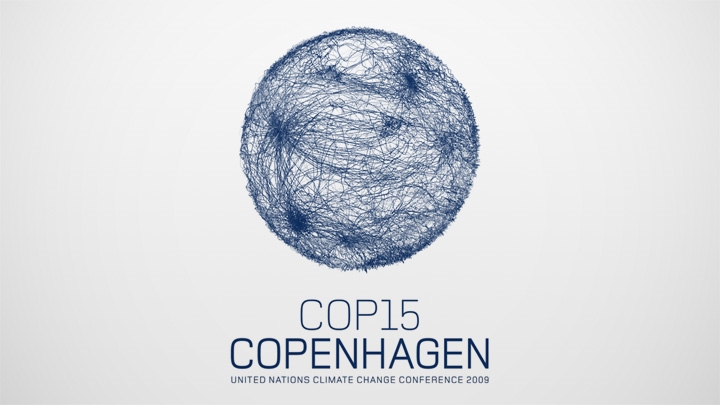
 |
COP15 -- Voice
G. R. Boynton
Abstract
COP15 met in December 2009. That was the first time Twitter use had been sufficiently widespread to be an important medium of communication for the UN COP meetings. And people attending the meeting took full advantage of Twitter. I captured 182,000 messages that were written by attendees. They were captured in streams. The paper analyzes the use of Twitter at the meeting and the streams that were captured.
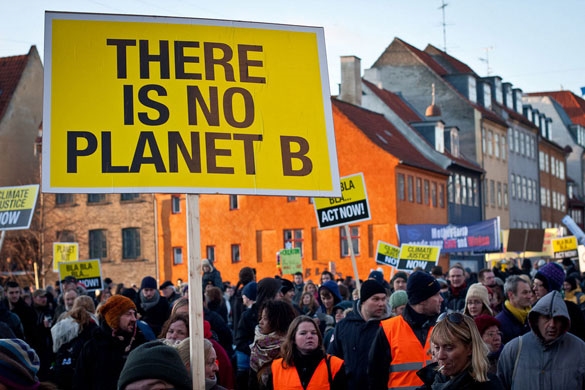 |
People, people from all over the globe. People without official position, without an official role to play traveled to Copenhagen for COP15. They arrived by foot, by bicycle, by every mode of transportation available. They traveled to Copenhagen to express their concern about the global environment and what we are doing to it. "There is no planet B." "Act now." And for the first time they came in full voice.
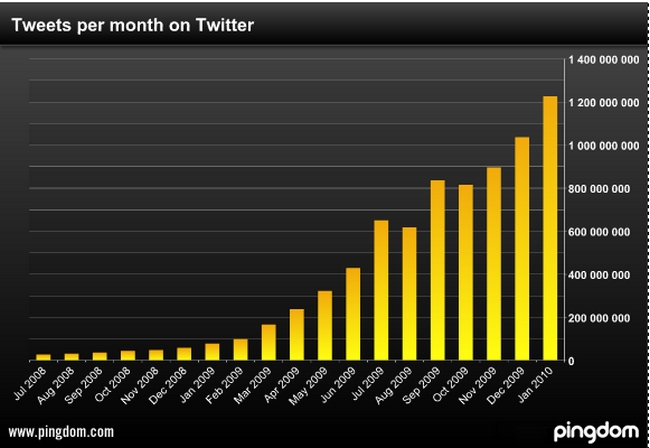 |
Twitter, 140 characters that are easy to write and easy to read. Messaging that is, mostly, unfettered by government and un-mediated by giant corporations. You can write it and read it on laptops, on netbooks, on smart telephones. It is technology for global communication available more broadly than any previous technology. At COP13 it was a tiny system known only to the most web savvy. By COP14 it was up to one million messages a day. But the next year was a year of dramatic growth as you can see in the figure. By COP15 it was 50 million messages a day blasting out to the entire planet. Unlike email and text messaging it is public communication. Each message is 'hello world, here I am, here is what I think.'
And Twitter they did.
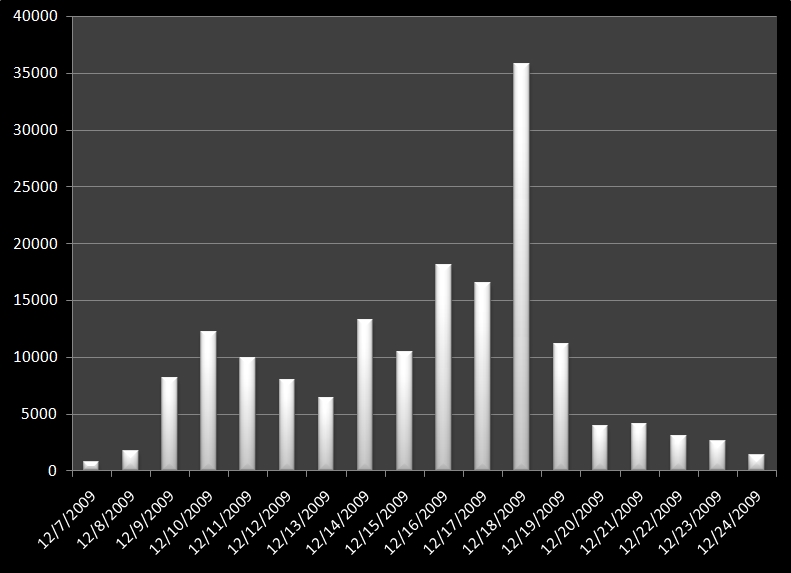 |
I searched for Twitter messages about COP15 beginning in late November and running through the end of December. The total was 182 thousand. The figure above gives the number of messages I found per day beginning December 7, which was the first day of the meeting, though December 25. I have an undercount for the first two days. After that the number of messages per day is just over or just under 10,000. Until December 18, the last day, when there were more than 35,000 messages. I included the messages following the meeting to show that the messaging did not stop. People continued sending messages with their reactions to the outcome of the conference.
Search is the principal means of engaging in communication for Twitter. You write and include language that I will search for when I am looking. The language of identification for searching develops as conventions. In this case I searched for six streams of communication.
Search Stream |
Number of Messages |
| #COP15 | 122859 |
| Obama Copenhagen | 24144 |
| #climate | 23470 |
| tcktcktck | 5239 |
| Copenhagen treaty | 3363 |
| Copenhagen draft | 2865 |
| total | 181940 |
Generally, no one 'registers' search phrases; you have to discover the language people are using in their messaging. #COP15 was the one 'official' hashtag for the conference, and it was far and away the largest stream. There were messages about Obama attending the meeting, Obama Copenhagen, both when he was deciding how he was going to schedule this with the Nobel Peace Prize award and when he made the trip. It is the second largest, in part, because it brought American politics into the discussion more forcefully than was otherwise the case. #climate is what they are all concerned about. tcktcktck is a group of like minded individuals who organize to promote an improved environment. Copenhagen treaty is the 'odd stream out.' It was a stream dominated by American citizens who were convinced that Obama was trying to give away American sovereignty; the word 'treaty' set them off. And Copenhagen draft was primarily about the final draft that came out on the eighteenth.
The streams are not completely independent. Some messages contained two or more of the terms for which I was searching. However, the overlap is just over 10 percent for two and less than 10 percent for the others. I did not get all of the Twitter messages about the meeting because some contained none of these phrases, but I did get these and it is a lot.
The mass media have been the monopoly suppliers of the public domain, for the general discussion of what we need to do and how we need to do it.
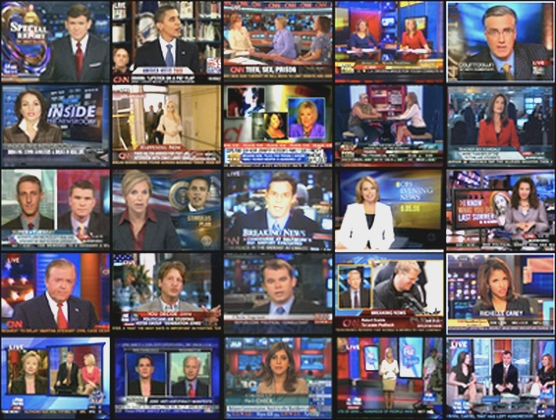 |
Suddenly, 'the people' have voice.
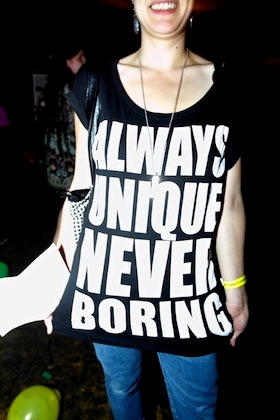 |
 |
Twitter and other social networks open global communication to people who were effectively silenced before for wont of a medium for them to voice their concerns. What does the public domain become when the mass media have to 'move over' and play a role among many streams of communication?
I will address this question by comparing the coverage of COP15 in the mass media with the streams of Twitter messaging. I will use The Washington Post for mass media. That is an unusual specification of mass media, but it is the hometown newspaper of the political elite of the worst offender on the planet. What they learn about COP15 is potentially quite important.
Before getting to the general patterns I will look at a single case to illustrate how the story is told by mass media and by twitter messaging.
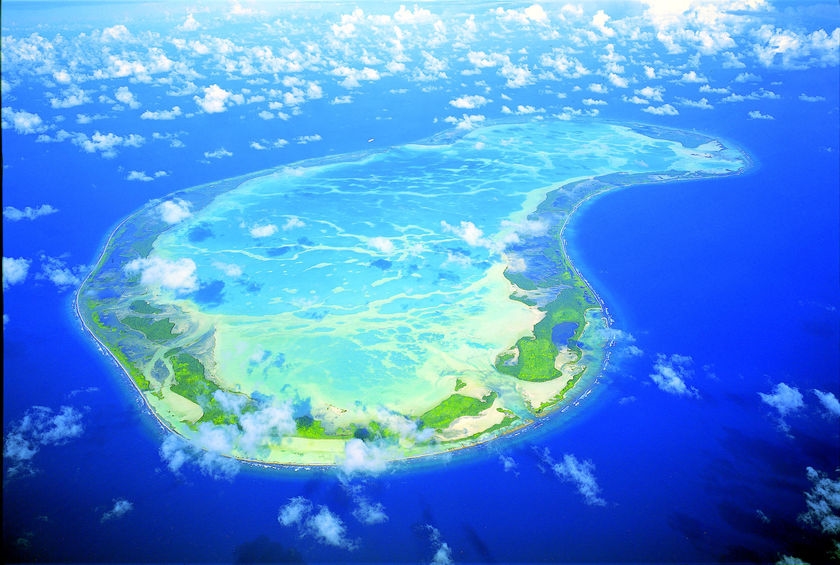 |
Tuvalu is a small island in the pacific. And this is their story.
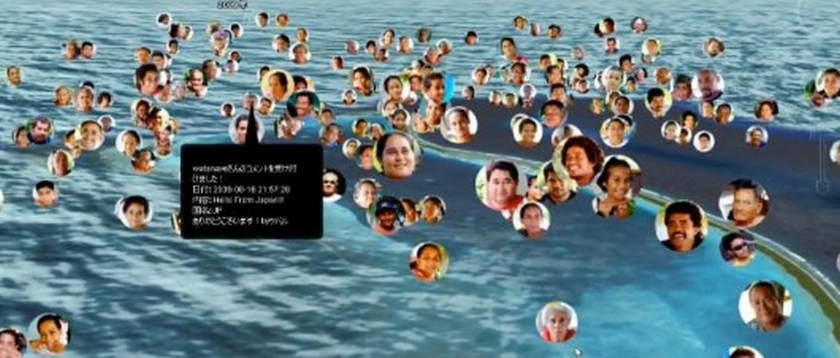 |
Unless we change they will be submerged; the Pacific ocean will rise to cover the island.
Tuvalu is mentioned twice in The Washington Post. The first time was on December 10. The headline of the story was "U.S. pushes for emissions cuts from China, developing nations." Tuvalu is one paragraph toward the bottom; 370 characters. The second mention was on December 19, and the headline was "Climate deal falls short of key goals." Again it was a paragraph toward the bottom of the story; this time 327 characters. From The Washington Post you could learn as much about Tuvalu as could be contained in six twitter messages.
The people at COP15 were more interested in Tuvalu than was The Post. They produced 1,600 messages about Tuvalu. For them Tuvalu became an icon for one of the conflicts at the meeting. The major polluter nations of the world were handing a destroyed environment to the rest of the world, and they were not willing to do nearly enough to forestall the ecological disaster that everyone foresaw. The rise of the Pacific to cover Tuvalu was symbolic of what they were wreaking on the planet. Who can deny the 'murder' of a nation -- no matter how small. Each of the streams contains messages about Tuvalu in rough proportion to their size except one. That one also symbolizes their dismay. The 'Obama Copenhagen' stream is 24,000 messages. Tuvalu is mentioned 5 times. It is the second largest stream, but its concern is only with the major polluters. The recipients of the pollution are secondary to the negotiations between the US and China and the other major nations of the world. But the story went out, carried by 1,600 twitter messages. Anyone following COP15 on Twitter would learn about Tuvalu and the plight it represented.
Now, quickly to the general patterns. I will discuss the five smaller streams because each is distinctive and shows how differently one can learn from their messaging.
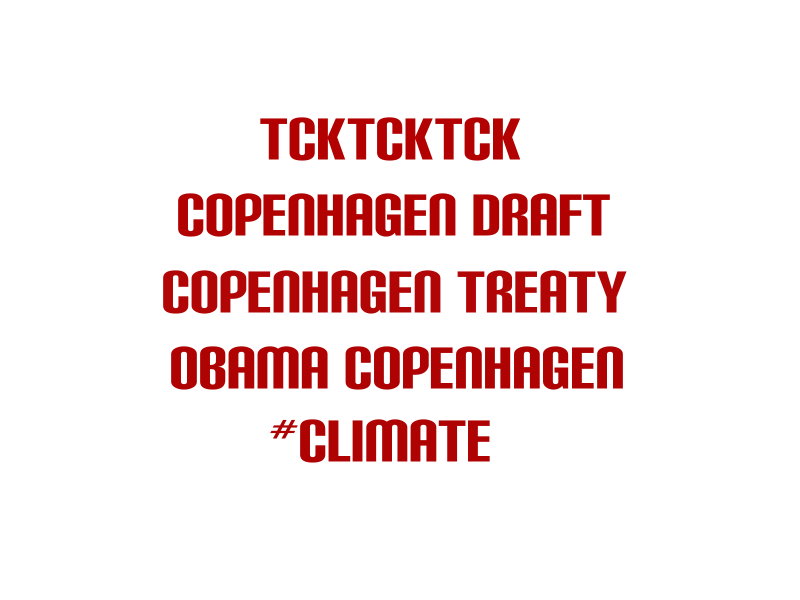 |
'Tcktcktck' is the name taken by a group concerned with the environment and acting to help make it better. Acting is the driving force in this stream of 5,000 messages. They arrived in Copenhagen with an electronic petition, and they were twittering their call to get others to sign. Their goal was 100,000 signatures which they reached during the first days of the meeting. Then they turned their attention to actions they could take in Copenhagen to express their concerns. Their language was the language of action. Voice, stand up for, working, beg, sit in. Their messages were infused with the language of action.
'Copenhagen draft' was a small stream with only 2865 messages and two peaks. One peak was the first days of the meeting. The draft treaty was not publicly available, and that caused considerable consternation among those who had traveled to Copenhagen. Then the draft was leaked and there were hundreds of messages that gave a url at which you could find and read the draft. The second peak was very similar. The 'final' draft was secret. Again it was leaked. Again there were hundreds of messages containing a url to a copy of the draft. This stream is a strong statement that secret drafts and closed meetings were not acceptable to those who had come to participate in this meeting -- even if participating only unofficially.
'Copenhagen treaty' is largely American nationalism carried to a zenophobic level. Three tweets capture the overall themes of the stream.
If Obama signs the UN Copenhagen Conference treaty, freedom & democracy are lost FOREVER http://bit.ly/3gech2
BLAST THIS PLEASE! NOW! Copenhagen Treaty will DESTROY US http://bit.ly/3GHwV2 @michellemalkin @glennbeck
The Road to Scientific Dictatorship Part 8 of 50 http://bit.ly/67Bizu copenhagen treaty
They did receive aid and comfort from England where Lord Monckton was making the argument against any international treaty on the environment.
'Obama Copenhagen' has two peaks and one underlying theme. The first peak is about his attendance at the meeting. Would he attend? How would he fit it with acceptance of the Nobel Prize for Peace. The second peak was when he arrived. It was messaging back and forth about what he could accomplish at the meeting. The underlying theme was about U.S. politics. The zenophobes were convinced that he wanted to give away sovereignty. And the question of getting congress to do anything was addressed repeatedly.
'#climate' was a stream of 23.4 thousand messages. It had the largest overlap with #COP15. Twelve thousand of the 23 thousand messages contained both #climate and #COP15. It illustrates one of the dynamics of Twitter communication. People want to write for and read messages written by people interested in a specific topic -- in this case COP15. To do that they have to have language they can use in writing and in searching that easily and quickly identifies the subject. Often the language starts with multiple identifying phrases and then 'collapses' to a single most generally used phrase. That is the role hashtags play. They are used to constitute a domain of communication. In this case for the first days there were almost as many messages containing #climate as containing #COP15. Over a brief period of days the #climate messages fell to a small proportion of the #COP15 messages. #COP15 had come to constitute the domain.
Five streams -- each with its own core message.
Conclusion
Let me end with an appeal.
COP15 is important to me because it is a continuation of 50 years of globalization of communication and culture. First, it was the military. Then it was the media. Now global communication is in our hands. Mobile telephones the planet over bring global communication to us all. COP15 is particularly important because of voice. They came from everywhere, and they wanted to have their say. No secret drafts. No closed meetings. They wanted their voices heard. When this emerges on a new scale that is among the most important of political phenomena.
Now the appeal: I know about new media. That is what I do. I have learned about COP15 -- primarily from these messages. I have many more pages of analysis than I can fit into a paper. COP16 is on the way, and I am collecting. But I do not know you. I would like to write for you as well as for myself. So, I hope any who are interested will tell me what you would find illuminating as I develop this research.
Addendum: from The Washington Post
U.S. pushes for emissions cuts from China, developing nations By Juliet Eilperin Washington Post Staff Writer Thursday, December 10, 2009
The small Pacific island nation of Tuvalu, threatened by rising sea levels, tried unsuccessfully Wednesday to get delegates to consider a legally binding new protocol that would have included a more ambitious climate target and mandatory greenhouse gas cuts for both industrialized and major emerging economies. "This is a moral issue," said Tuvalu's delegate, Ian Fry.
Climate deal falls short of key goals
By Juliet Eilperin and Anthony Faiola
Washington Post Staff Writer
Saturday, December 19, 2009
But it sparked a rebellion among more vulnerable nations. They said they could not accept an agreement that lacked deep emissions commitments from the industrialized world.
"The science tells us we must act now, and urgently," said Ian Fry, climate-change representative for Tuvalu, which may be submerged by rising seas in a matter of decades. "To use a Biblical allusion, it looks like we're being offered 30 pieces of silver to bargain away our future. Mr. President, our future is not for sale."
The room burst into applause.